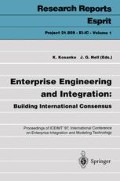Abstract
We propose a framework combining several formalisms for the Requirements Engineering (RE) of discrete manufacturing systems. Each formalism relies upon a set of concepts that together form an ontology.
Access this chapter
Tax calculation will be finalised at checkout
Purchases are for personal use only
Preview
Unable to display preview. Download preview PDF.
References
ESPRIT Consortium AMICE, editor. CIMOSA: Open System Architecture for CIM, volume 1 of Research Reports ESPRIT, Project 688/5288 AMICE. Springer-Verlag, 2nd revised and extended edition, 1993.
Klemens Böhm and Amilcar Semadas. A logic to specify real-time object behaviour. Technical report, Departamento de Matemática, Instituto Superior Técnico, Lisbon (Portugal), 1993.
Philippe Du Bois. The Albert II Language: On the Design and the Use of a Formal Specification Language for Requirements Analysis. PhD thesis, Computer Science Department, University of Namur, Namur (Belgique), September 1995. Available at http://www.cediti.be/~pdu/thesispr-uk.html.
Eric Dubois, Philippe Du Bois, and Michaël Petit. Eliciting and formalising requirements for CIM information systems. In C. Rolland, F. Bodart, and C. Cauvet, editors, Proc. of the 5th conference on advanced information systems engineering — CAiSE ’93, pages 252–274, Paris (France), June 8–11, 1993. LNCS 685, Springer-Verlag. Available at ftp://ftp.info.fundp.ac.be/publications/RP/RP-93-001.ps.Z.
Eric Dubois, Philippe Du Bois, and Jean-Marc Zeippen. A formal requirements engineering method for real-time, concurrent, and distributed systems. In Proc. of ICSE-17 Workshop on Formal Methods Applications in Software Engineering, Seattle WA, April 24–25,1995.
Eric Dubois and Michaël Petit. Using a formal declarative language for specifying requirements modelled in CIMOSA. In François Vernadat, editor, Proc. of the European workshop on Integrated Manufacturing Systems Engineering — IMSE ’94, pages 233–241, Grenoble (France), December 12–14, 1994. INRIA Rhône-Alpes.
Michael Jackson and Pamela Zave. Deriving specifications from requirements: An example. In Proc. of the 17th International Conference on Software Engineering — ICSE’95, pages 15–24, Seattle WA, April 23–30, 1995. ACM Press.
Bernaras A., Corera J., Schreiber A. Th., Laresgoiti I., Anjewierden A. and Wielinga B. J. Ontologies as vehicles for reuse: a mini-experiment. In Proceedings of Tenth Knowledge Acquisition for Knowledge-Based Systems Workshop (KAW’96), Banff, Alberta, Canada, November 9–14, 1996.
M. A. Jeusfeld M. Jarke and M. Staudt. Conceptbase v4.1 user manual. Technical report, RWTH Aachen, Germany, 1996. available online at http://www-i5.informatik.rwthaachen.de/CBdoc/userManual-V41/.
M. A. Jeusfeld, M. Staudt, M. Jarke, R. Gallersdrfer and S. Eherer. Conceptbase - a deductive object base for meta data management. Journal of Intelligent Information Systems, Special Issue on Advances in Deductive Object-Oriented Databases, 4(2):167–192, 1995.
J. Mylopoulos, A. Borgida, M. Jarke, and M. Koubarakis. Telos: A language for representing knowledge about information systems. ACM Transaction on Information Systems, 8(4):325–362, October 1990.
Michaël Petit and Eric Dubois. A formal requirements engineering framework for CIM infrastructures reengineering. In F. Kimura, J. Goossenaerts and H. Wortmann, editors, Proc. of the DIISM’96 conference. Eindhoven University of Technology, September 1996.
Eric Dubois, Philippe Du Bois and Jean-Marc Zeippen. On the use of a formal R.E. language - the generalized railroad crossing problem. In Proceedings of the Third International Symposium on Requirements Engineering (RE’97), Annapolis, Maryland (USA), January 5–8, 1997.
Mark S. Fox and Michael Gruninger. Ontologies for enterprise integration. In Michael Brodie, Mathias Jarke, and Michael Papazoglou, editorsProc. of the Second International Conference on Cooperative Information Systems — CoopIS-94, pages 82–89, Toronto (Canada), May 17–20, 1994.
E. Yu. Towards modelling and reasoning support for early-phase requirements engineering. In Proceedings of the 3rd IEEE Int. Symp. on Requirements Engineering (RE’97), Washington D. C., USA, Jan. 6–8, 1997.
Eric S., K. Yu. Modelling Strategic Relationships for Process Reengineering. PhD thesis, Computer Science Department, University of Toronto, Toronto (Canada), 1995. Also appears as Technical Report DKBS-TR-94–6, December 1994.
Author information
Authors and Affiliations
Editor information
Editors and Affiliations
Rights and permissions
Copyright information
© 1997 ECSC-EC-EAEC, Brussels-Luxembourg
About this chapter
Cite this chapter
Petit, M., Dubois, E. (1997). Defining an Ontology for the Formal Requirements Engineering of Manufacturing Systems. In: Kosanke, K., Nell, J.G. (eds) Enterprise Engineering and Integration. Research Reports Esprit. Springer, Berlin, Heidelberg. https://doi.org/10.1007/978-3-642-60889-6_41
Download citation
DOI: https://doi.org/10.1007/978-3-642-60889-6_41
Publisher Name: Springer, Berlin, Heidelberg
Print ISBN: 978-3-540-63402-7
Online ISBN: 978-3-642-60889-6
eBook Packages: Springer Book Archive

